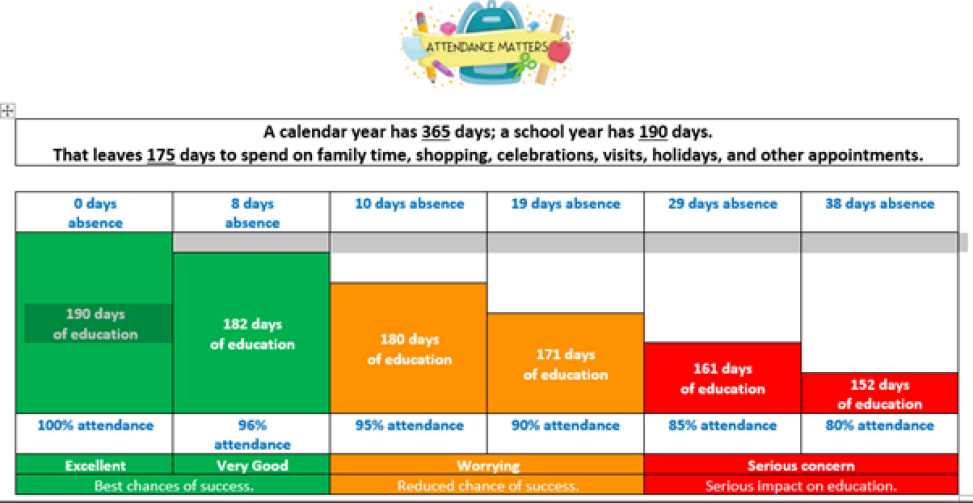Attendance and Absence
Attendance
At Bassingbourn Community Primary School, we expect all children on roll to attend every day, when the school is in session, as long as they are fit and healthy enough to do so. We do all we can to encourage the children to attend, and to put in place appropriate procedures. We believe that the most important factor in promoting good attendance is the development of positive attitudes towards school. To this end we strive to make our school a happy and rewarding experience for all children. We will also make the best provision we can for those children who, for whatever reason, are prevented from coming to school.
The school keeps accurate attendance and absence records which are regularly reported to the Governing Body.
Each week, we celebrate the class who has had the highest attendance for the previous week.
Absence
Government legislation requires parents to ensure that their children attend school regularly and punctually and has laid down guidance on authorised and unauthorised absences. Authorised absence includes illness, medical and dental appointments and religious observances.
Lateness
School starts promptly at 8.45 a.m. If a child arrives at school after this time, they should go to the school office to sign in. This will then be coded in the register as “L” to indicate that the child was late. If a child arrives at school more than 30 minutes after the start of the school day, this will be considered an unauthorised absence.
Illness and Medicines
If your child is absent from school, or unavoidably late, please telephone the school office by 8:20 am, giving the reason. If the child is absent for more than 1 day, please telephone each day to give the reason for the absence. If no reason is given for subsequent days, then our school office will ring to request this information. If absence continues without explanation further contact will be made to ensure safeguarding, this may be a home visit – where we will place a letter through letter boxes asking an adult to call as soon as possible – or a phone call to the police to make them aware that a child is not in school.
Children with mild coughs, colds, sore throats, sneezing and runny noses who are otherwise well can continue to attend school. However, if they develop a high temperature (above 38°C) they should stay at home until their temperature has reduced and are well enough to return to school. Please do not send your child to school if they are unwell; we have very limited facilities for looking after sick children. Children who have suffered sickness or diarrhoea should not return to school for at least 48 hours after the sickness or diarrhoea has stopped. If you are uncertain of how long your child should be absent, please refer to the table below (guidance from HSC):
Table-of-Illnesses-and-Periods-of-Absence.pdf
It is essential that we have an up-to-date day time telephone number where we can contact parents should children become ill or have an accident.
If it is necessary for medicines to be brought into school, then the prescribed medicine should be clearly labelled with the name of the child. It should be brought to the school office where you will be required to complete a consent form detailing the dosage and times when the medicine should be administered. Over the counter medicines such as ointments must also be agreed with the school office and a subsequent form completed. We will not accept any medicines that do not come in original packaging.
Parents of children requiring regular or long-term medical treatment are welcome to discuss this with a member of the Senior Leadership Team.
Collecting Before the End of the Day
If it is necessary for your child to leave school before the end of the day, please ring or email the school office stating the time at which the child will be collected. No child will be allowed to leave the site unless collected by their parents or another adult who is known by the school to have permission from the parent to collect their child. All children must be signed out at the school office.
Leave of Absence
We believe that children need to be in school for all sessions, so that they can make the most progress possible. However, we do understand that there are times where a parent may request leave of absence in exceptional circumstances. Holiday requests will not be authorised. Prior to any leave of absence, a request should be made by completing a ‘Term Time Leave Request’ form. These forms are available below and should be completed at least three weeks before the absence. Parent/Carers will be informed, by email, as to whether the request meets the criteria for an authorised absence.
Leave of Absence Term Time Request Form
Please note that the majority of requests from parents for holidays during term time are regularly marked as unauthorised; this is in line with guidance at a local and national level.
In April 2017, the Supreme Court upheld the ban on parents taking their children out of school for family holidays during term time. Delivering the judgment, the deputy president of the Supreme Court, Lady Hale, said: “Unauthorised absences have a disruptive effect, not only on the education of the individual child but also on the work of other pupils.
“If one pupil can be taken out whenever it suits the parent, then so can others ... Any educational system expects people to keep the rules. Not to do so is unfair to those obedient parents who do keep the rules, whatever the costs or inconvenience to themselves.”
Unauthorised Absence
Unauthorised absence or truancy is defined as any unaccounted for absence from school or a child arriving 30 minutes after the register has been taken without a suitable explanation. The truancy figures for each school are collated during the summer term and any unauthorised absence will be recorded on your child’s school report.

Celebrating Attendance in School

Attendance in school is celebrated in assemblies. Classes with over 96% attendance will take part in our whole school attendance game board.
Monitoring
Our Attendance team continue to regularly monitor attendance in conjunction with the Local Authority Attendance Improvement Officer.
Click here for our Attendance Policy on our Policies page. Should you have any queries about the policy please speak to a member of the Senior Leadership Team.
FAQs
If my child is late, is this an absence?
If your child arrives after 9.00am, they would be marked as Late before Register Closes (L), this is not an absence but DOES impact on your child being ready to learn, receiving important information and having some social time. If your child arrives after the register has closed but during the morning sessions at some point, they would be marked Late After Register Closed (U) which is unauthorised lateness, or an authorised absence code E.g. Medical (M) if they had an appointment to attend, or Other Authorised Circumstances (C). These are absences and shows the child did not obtain a present register mark for that official registration session. However, for the purposes of Fire Regulations it shows they have arrived on site at some point.
What are official registration periods?
There is a legal requirement for registration to be taken twice a day. Schools set these times within the structure of the day; normally between 8.30 and 9.00am depending on the time that the first lesson starts, and again after mid-day; between 12.00 and 1.30pm. These registers form the ‘official register’ and these attendance and absence marks are what is reported to the Department of Education at each Census Data point in the year. The whole school attendance level is determined from these registrations and the school is judged by Ofsted on their attendance level.
Why does the school require me to update my contact details frequently?
The school need to be able to make contact with you in an emergency. This may be to obtain permissions, for example a medical procedure if your child is involved in an accident, or to inform you they have gone missing if they did not register at school that morning, therefore it is essential the school regularly check contact details.
How many days does my child have to attend school each academic year?
The law and regulations state that children have to be given 190 days of education per year.
Why does my school need me to contact them every day if my child is poorly?
Communication is important to work together in ensuring your child is safe and can access their learning. The school cannot assume your child is at home, they have a safeguarding duty to know where your child is. If they have been sick the day before and we don’t get a call from you, we have to assume they are on their way to school that day. If a child does not arrive at school it could be that they have made their way to school but not arrived, therefore neither you nor the school would be aware of where they were.
Why do I get letters/email letters from the school regarding attendance levels?
Once you have registered your child at a school the law and regulations state parents must ensure their child attends school regularly and they may be committing an offence if they fail to do so. The school have a duty to inform you what your child’s attendance level is so that they can work with you and your child to prevent absence occurring or help to improve it if it becomes a concern.
What is Persistent Absence?
Absence of less than 90% during any 6-8 week period; or less than 90% overall at any point during the year. In 2022/2023, we had 41 persistent absentees compared to 8 in 2020/2021.
What is Severe Absence?
Absence of less than 50% during any 6-8 week period or less than 50% overall at any point during the year.
What are Penalty Notices?
Penalty Notices are fines. They are issued by the Local Authority for absence from school that reaches Persistent or Severe Absence criteria. When issued, you have 21 days to pay the fine at £60. If you pay it between 21 and 28 days, it goes up to £120. If you fail to pay it within 28 days, the matter is put to the Magistrates Court and the Magistrates will determine the amount of costs and fine you pay (can be up to £1,000 for a first offence).
Under what circumstances could attendance information be shared?
If your child is absent and there are ongoing concerns regarding attendance, if we haven’t been able to make contact with you re your child’s absence, if your child is presumed missing, or if we have information that they may be involved in crimes outside of school, or generally potentially at risk. We share statutory attendance information with the Local Authority on a weekly/monthly basis. We share concerns and non-attendance information with the community policing teams. We share non-specific attendance information with sibling’s schools where required (i.e. if partnership working is required to support all children in the family, or to check absence reasons for safeguarding and legal duties). We would share non-sensitive information with other family members who you have recorded as contacts on your child’s record. Information is also shared with the Local Authority Early Help Team and/or Children Social Care (if concern is urgent or they have received a contact regarding your family) where appropriate to keep your child safe or to help you in gaining support.
For more Information Resources for families Children's Commissioner for England
Barriers to Attending School
It is important that schools and parents work together to ensure attendance is encouraged at all levels of a student’s life and where barriers to physically attending school cannot be resolved, it is important that the partnership working enables children to freely access their right to education, as they should, in whatever way they require. We understand that absences do happen for legitimate, exceptional and unavoidable reasons and always want our families to feel listened to and supported if there are barriers to your child attending school.
School Anxiety and Refusal Parent Guide to Support Young Minds
General Absence
If your child is absent, you should keep in contact with the school whilst your child is absent to liaise regarding potential support and when your child is well enough to access or return to their education, speak to your child’s teacher to find out what your child needs to catch up on and how you can support them to do so.
It is important to remember that although the school will authorise absences due to illness, this is not automatic if there is a concern in respect of a child’s attendance. We are required to explore all absence, especially if it becomes too frequent, or there are any other concerns.
Medical evidence will not be routinely requested but it is always appreciated and helpful to provide a copy if you are able to (e.g. hospital letters or email, appointment cards or text messages, prescriptions notifications, antibiotic or medication packaging). This will help the Attendance team to authorise as much absence as possible and enables school to offer early help if needed; especially if a medical issue or concern requires additional support or whole family plan. This also prevents unauthorised absences being recorded which could cause escalation later.
We will always keep you informed of your child’s attendance level and any concerns regarding absences by phone calls, emails and letters. It is also often helpful to meet with you face to face if concerns are ongoing to discuss what support may. If concerns continue, a more formal meeting would be arranged to complete a Parental Attendance Agreement (Parent Contract as per DfE guidance) and at this point medical evidence would be highly advised as absence is less likely to authorised without it. Persistent and Severe Absence from school is a safeguarding matter, as is where a Child is Missing from Education completely (with no alternative appropriate education in place). This means that where a school has a concern about a child’s attendance, they must bring it to the attention of parents, and any relevant external agencies so that collaborative partnership working can commence.
Partnership working involves the whole child, therefore along with parents/carers, children and schools, this often needs to also include health services, support services, crime prevention and community policing. Although sharing of information is always done sensitively and proportionately within the requirements of GDPR and Data Protection, where a safeguarding concern is present, which may mean a child is potential risk of harm, information will be shared as appropriate. Normal practice would be to ensure this is done in partnership with you as the parent but occasionally (almost rarely) information has to be shared without permission; this is because SAFEGUARDING overrides GDPR.
‘The child’s welfare is paramount’ – Children’s Act 1989
Statistics to Put Absence into Context
Ideally every child achieving 100% attendance would be amazing, but we are realistic, so we feel a minimum of 96% attendance is highly achievable for most students but for those with barriers to attending, it’s important we work together to keep their access to education open.
90% attendance every year for 5 years of education, would mean half a year’s education will have been missed. The impact of this at exam time would be like doing a jigsaw puzzle with most of the middle pieces missing.
Research shows that for every 17 days missed from school a child is likely to drop one GCSE grade in EVERY subject.
Only 35% of those with attendance between 80-90% will achieve five good grades (9-4) at GCSE including English and Maths.
Our Top 10 Ways for Promoting Good Attendance
1) Talk to your child about their day. Highlight what went well and what could have been different if not gone so well – this teaches problem solving skills.
2) Support your child to share their learning at home.
3) Put good evening routines in place, by preparing for the next day in advance to remove stresses from the next day.
4) Remove access to computer equipment and phones at least an hour before sleep; this prevents the ‘blue light’ emitted from electronic items to affect their sleep hormones, helping them to get to sleep and rest.
5) Ensure your morning routine helps your child to attend every day, on time, equipped and ready to learn. Poor punctuality also affects their attendance level.
6) Always keep the school informed of anything that may cause absence so they can support you and your child to keep absence to a minimum and offer early help where required.
7) Book medical appointments outside of school hours wherever possible, or if unable to do so, try to arrange it so they miss as little school as possible. To support the school to authorise absences, it is appreciated and helpful to provide them with appointment cards, letters, text screenshots wherever possible.
8) Encourage your child to eat healthily, get regular exercise and limit the time they spend on computer equipment.
9) Encourage your child to speak to their class teacher, or member or staff they feel comfortable with about anything that is bothering them, however small. TACKLE THINGS EARLY as this often prevents them from becoming a problem later.
10) Do not book holidays within term time, they are unlikely to be authorised and not only will affect your child’s learning but will cause you to have to pay a fine. For an absence to be authorised you must prove the absence is exceptional circumstances.

